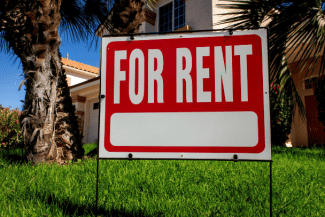The Pros and Cons of Being a Landlord

Pros of being a landlord
Extra income
Rental income is by far one of the greatest benefits of owning investment properties. If the rental income exceeds the property’s holding expenses (like property taxes, insurance, repairs, and maintenance) as well as financing cost, the landlord receives a check each month creating a consistent source of income for as long as the property is occupied and the tenant pays on time.
Tax deductions
Another huge benefit of owning a rental property is the tax benefits. There are a slew of tax deductions available for investment properties including:
- Business deductions (if the property is owned by a company or LLC).
- The cost of the property, including property insurance, property taxes, and certain maintenance expenses or repairs.
- Depreciation
- Mortgage interest
Many of these benefits are available only to rental real estate investors and can equate to significant tax savings over time.
Equity and appreciation of the property
While not always the case, in most instances, real estate appreciates, or increases in value, over time. Depending on where the rental real estate is owned, there is a chance the landlord can benefit from the future appreciation of the property in addition to the extra income it produced from being rented.
If the rental income exceeds the property’s expenses and financing cost, the tenant’s rental payment pays the mortgage, lowering the principal balance each month it’s rented. That means the landlord is building equity in the home without having to pay the mortgage or interest themselves.
Cons of being a landlord
Time
While income from a rental is considered passive, rental property is far from being a hands-off, passive investment. A lot of work goes into owning a rental property. Landlord responsibilities include:
- Advertising vacancies and showing the property
- Screening tenants
- Collecting deposits and executing leases
- Tenant communication
- Coordinating maintenance and repairs
- Collecting rent
- Filing evictions, if necessary
One rental property may not require a substantial amount of work, but multiple rental units will. Some landlords choose to outsource the ongoing time commitment of managing a rental property to a property management company for a flat monthly fee or percentage of the rental income. Whether you hire a property manager or manage your rentals yourself, there is a definite time commitment to investing in rental property.
Risk and liability of renting a property
Renting a property to a tenant opens up the possibility of certain risks and liability, like litigation from a tenant getting injured on your property or failure to comply with your state’s tenant-landlord laws. On the flip side, you could find yourself having to pursue damages against a tenant because they trashed your property after you had to evict.
While there are ways to mitigate risk, like having an adequate liability policy for the property and owning each property in an individual company, it still is a risk. Stay up to date on federal, state, and local rental laws, and get adequate coverage to help better protect yourself.
Maintenance and repairs
Properties need to be maintained and kept up over time. Tenants will cause damage or general wear and tear on your property, and eventually, items will need to be replaced, repaired, or updated.
Occasionally, unexpected expenses will arise. Just a few examples include:
- A pipe bursting, flooding the property.
- The roof needing to be replaced sooner than anticipated.
- The A/C or furnace breaking in the dead of winter or summer.
- Finding the property trashed after a tenant moves out.
Set aside a portion of your rental income for ongoing maintenance and repairs, and be prepared to coordinate with tenants, contractors, plumbers, or repair people to fix the issues.
Long-term investment
Rental properties are best treated as long-term investments, as the benefits are maximized the longer the property is held. This means your money is tied up in a property for a long period of time. If your property has equity, you do have the opportunity to leverage a portion of that equity, but there is far less liquidity in a rental property than in alternative investments like real estate investment trusts (REITs).
Vacancy
Everything is great when a property is rented, but when a property is vacant, you as the landlord are still responsible for paying the property’s expenses and financing costs. If the property is vacant longer than expected, it may be a financial burden to maintain the cost of holding the property.
| PROS OF BEING A LANDLORD | CONS OF BEING A LANDLORD |
|---|---|
| • Extra income• Tax deductions
• Equity and appreciation |
• Time commitment• Risk and liability
• Ongoing maintenance and unexpected repairs • Capital tied up in a long-term investment • Vacancy |
In summary
Being a landlord is not for everyone. Consider who you are and what you want out of your real estate investments, and determine whether the pros and cons align with your investment goals and personality type. Do you have thick enough skin to evict a tenant if they stop paying? Are the tax benefits or extra cash worth dealing with an occasional bad tenant, unexpected costly repairs, or risk exposure? Only you can decide if being a landlord is the right choice for you and your investing career. Knowing what to expect should make that decision a bit easier.
Become A Mogul Today
Real estate is one of the most reliable and powerful ways to grow your wealth – but deciding where to start can be paralyzing.
That’s why we launched Mogul, a breakthrough service designed to help you take advantage of this critical asset class. Mogul members receive investing alerts, tax optimization strategies, and access to exclusive events and webinars. Past alerts have included investments with projected IRRs (internal rates of return) of 16.1%, 19.4%, even 23.9%.
Source: fool.com















 Accessibility
Accessibility